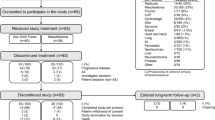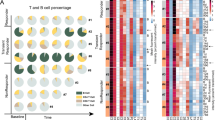Summary
Background CD-30 is highly expressed in some patients with non-seminomatous germ-cell tumors. Brentuximab vedotin is an antibody–drug conjugate directed to CD-30. We report a phase 2 trial of brentuximab vedotin in patients with chemo-refractory GCT. Patients and methods This is a single arm, two cohort phase 2 trial investigating brentuximab vedotin 1.8 mg/kg IV every 3 weeks until disease progression or intolerable toxicities in patients with relapsed GCT who have no curative options. Patients with mGCT who progressed after first line cisplatin-based chemotherapy and after at least 1 salvage regimen (high-dose or standard-dose chemotherapy) were eligible. CD30 expression was assessed and two cohorts defined: CD30 positive and CD30 negative/unknown. Results 18 patients were enrolled. Median age 34.7 (range, 23–56). All patients had non-seminoma. Median AFP 4.9 (range, 1–219,345) and hCG 282 (range, 0.6–172,064). Five patients had late relapse (> 2 years). Median number of previous chemotherapy regimens was 3 (range, 2–7). Ten patients received prior high-dose chemotherapy. Seven patients had positive CD30 staining. There were two grade 3 treatment-related adverse events. No partial or complete responses were observed. 6 patients achieved radiographic stable disease (range, 9–14.9 weeks), 5 had elevated AFP or hCG at trial entry and all 5 had transient > 50% decline in baseline AFP/hCG: 4 had CD30 -ve and 2 had CD30 + ve staining; 10 patients had progression of disease as their best response; 2 were not evaluable for response. Conclusion Brentuximab vedotin does not appear to have clinically meaningful single-agent activity in patients with refractory GCT.




Similar content being viewed by others
Data Availability
All data and materials support published claims and comply with field standards.
References
Siegel RL, Miller KD, Jemal A (2019) Cancer statistics, 2019. CA: Cancer J Clin. 69(1): 7–34
Einhorn LH (2002) Curing metastatic testicular cancer. Proc Natl Acad Sci 99(7):4592–4595
Hanna NH, Einhorn LH (2014) Testicular cancer–discoveries and updates. N Engl J Med 371(21):2005–2016
Adra N et al (2017) High-Dose Chemotherapy and Autologous Peripheral-Blood Stem-Cell Transplantation for Relapsed Metastatic Germ Cell Tumors: The Indiana University Experience. J Clin Oncol 35(10):1096–1102
Einhorn LH et al (2007) High-dose chemotherapy and stem-cell rescue for metastatic germ-cell tumors. N Engl J Med 357(4):340–348
Feldman DR et al (2010) TI-CE high-dose chemotherapy for patients with previously treated germ cell tumors: results and prognostic factor analysis. J Clin Oncol 28(10):1706–1713
Murphy BR et al (1993) Surgical salvage of chemorefractory germ cell tumors. J Clin Oncol 11(2):324–329
Francisco JA et al (2003) cAC10-vcMMAE, an anti-CD30–monomethyl auristatin E conjugate with potent and selective antitumor activity. Blood 102(4):1458–1465
Moskowitz CH et al (2015) Brentuximab vedotin as consolidation therapy after autologous stem-cell transplantation in patients with Hodgkin’s lymphoma at risk of relapse or progression (AETHERA): a randomised, double-blind, placebo-controlled, phase 3 trial. The Lancet 385(9980):1853–1862
Prince HM et al (2017) Brentuximab vedotin or physician’s choice in CD30-positive cutaneous T-cell lymphoma (ALCANZA): an international, open-label, randomised, phase 3, multicentre trial. The Lancet 390(10094):555–566
Gopalan A et al (2009) Testicular mixed germ cell tumors: a morphological and immunohistochemical study using stem cell markers, OCT3/4, SOX2 and GDF3, with emphasis on morphologically difficult-to-classify areas. Mod Pathol 22(8):1066–1074
Lau SK, Weiss LM, Chu PG (2007) D2–40 immunohistochemistry in the differential diagnosis of seminoma and embryonal carcinoma: a comparative immunohistochemical study with KIT (CD117) and CD30. Mod Pathol 20(3):320–325
Pallesen G, Hamilton-Dutoit SJ (1988) Ki-1 (CD30) antigen is regularly expressed by tumor cells of embryonal carcinoma. Am J Pathol 133(3):446
Liu A et al (2010) Diagnostic utility of novel stem cell markers SALL4, OCT4, NANOG, SOX2, UTF1, and TCL1 in primary mediastinal germ cell tumors. Am J Surg Pathol 34(5):697–706
Teng LH et al. (2005) Expression and diagnostic significance of OCT4, CD117 and CD30 in germ cell tumors. Zhonghua bing li xue za zhi, Chinese J Pathol. 34(11)711–715.
Giannatempo P et al. (2013) 936 Persistence of cd30 expression by embryonal carcinoma (ec) in the treatment time course. A retrospective series of multi-relapsing germ-cell tumors (GCT). Journal of Urol. 189(4S):e385-e385.
Albany C et al (2018) Treatment of CD30-Expressing Germ Cell Tumors and Sex Cord Stromal Tumors with Brentuximab Vedotin: Identification and Report of Seven Cases. Oncologist 23(3):316
Necchi A et al. (2016) Brentuximab vedotin in CD30-expressing germ cell tumors after chemotherapy failure. Clin Genitourin Cancer. 14(4)261–264. e4.
Jacobsen ED et al (2015) Brentuximab vedotin demonstrates objective responses in a phase 2 study of relapsed/refractory DLBCL with variable CD30 expression. Blood, The Journal of the American Society of Hematology 125(9):1394–1402
Masuda S et al (2015) CD30-targeting immunoconjugates and bystander effects. Nat Rev Clin Oncol 12(4):245
Simon R (1989) Optimal two-stage designs for phase II clinical trials. Control Clin Trials 10(1):1–10
Einhorn LH et al (2006) Phase II study of imatinib mesylate in chemotherapy refractory germ cell tumors expressing KIT. Am J Clin Oncol 29(1):12–13
Feldman DR et al (2010) Phase II trial of sunitinib in patients with relapsed or refractory germ cell tumors. Invest New Drugs 28(4):523–528
Kollmannsberger C et al (1999) Cisplatin-refractory, HER2/neu-expressing germ-cell cancer: induction of remission by the monoclonal antibody Trastuzumab. Ann Oncol 10(11):1393–1394
Rick O et al (2006) Activity of thalidomide in patients with platinum-refractory germ-cell tumours. Eur J Cancer 42(12):1775–1779
Necchi A et al (2017) Pazopanib in advanced germ cell tumors after chemotherapy failure: results of the open-label, single-arm, phase 2 Pazotest trial. Ann Oncol 28(6):1346–1351
Adra N et al (2018) Phase II trial of pembrolizumab in patients with platinum refractory germ-cell tumors: a Hoosier Cancer Research Network Study GU14-206. Ann Oncol 29(1):209–214
Funding
This work was supported by Seattle Genetics. No grant number is applicable.
Author information
Authors and Affiliations
Contributions
Study concept and design: Adra, Feldman, Einhorn, Albany. Financial and administrative support: Adra. Provision of study materials or patients: Adra. Collection and assembly of data: All authors. Data analysis and interpretation: All authors. Drafting and writing: Ashkar, Adra. Review and final approval of manuscript: All authors.
Corresponding author
Ethics declarations
Ethics approval
This study was approved by the Indiana University IRB.
Consent to participate
Informed consent was obtained from all individual participants in this study.
Consent for publication
The authors affirm that human research participants provided informed consent for publication.
Competing interests
There are no conflicts of interest to disclose.
Additional information
Publisher's Note
Springer Nature remains neutral with regard to jurisdictional claims in published maps and institutional affiliations.
Key Message
In this phase II trial, brentuximab vedotin was well tolerated but did not appear to have single agent activity in refractory germ cell tumors. CD-30 staining was positive in 7 patients. Six patients had stable disease while the rest had progressive disease as best response.
Rights and permissions
About this article
Cite this article
Ashkar, R., Feldman, D.R., Adra, N. et al. Phase II trial of brentuximab vedotin in relapsed/refractory germ cell tumors. Invest New Drugs 39, 1656–1663 (2021). https://doi.org/10.1007/s10637-021-01134-1
Received:
Accepted:
Published:
Issue Date:
DOI: https://doi.org/10.1007/s10637-021-01134-1




